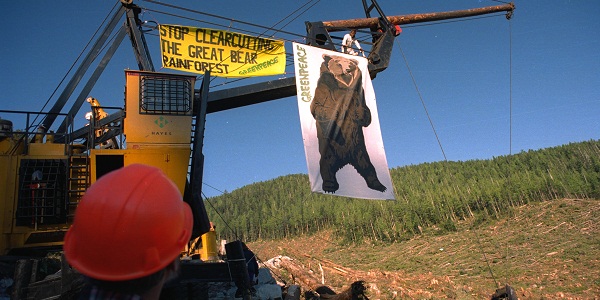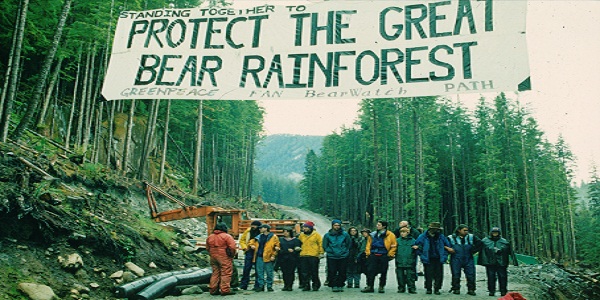The War in the Woods
posted by: Administrator, March 23, 2012 at 10am
by Jens Wieting, Valerie Langer, and Eduardo Sousa
This is the first article in a three-part series on Canada’s Great Bear Rainforest. February marked the six-year anniversary of the Great Bear Rainforest Agreements, which were celebrated around the world as one of the greatest rainforest conservation stories of our time. To this day, however, half of the Great Bear Rainforest is still open to logging. Greenpeace, Sierra Club BC, and ForestEthics have launched a campaign calling on B.C. Premier Christy Clark to speed up the outstanding steps for healthy forests and thriving communities, before it’s too late.
In the spring of 2009, then-agriculture and lands minister Ron Cantelon declared, “The war [in the woods] is over.” The provincial government, industry, First Nations, and environmental groups had recently renewed their commitment to protect the Great Bear Rainforest from unsustainable levels of logging. The announcement came at the start of a heated election race in British Columbia, and was quickly established as a wedge issue, with voters long-convinced that the largest intact coastal temperate rainforest on the planet (which happened to be located in their backyard) should be preserved.
In fact, the B.C. government had told voters in 2006 that the groundbreaking Great Bear Rainforest Agreements would be completed by 2009. After years of protests and market campaigns aimed at protecting this rare forest from industrial logging, the 2006 agreements committed to preserving more than two million hectares, or an area half the size of Switzerland. They established stricter rules for logging (as part of an ecosystem-based management approach) outside of protected areas, committed to cultivating a new conservation-based economy in the region, and provided First Nations communities with increased decision-making powers over their traditional territories.

Photo Credit: Greenpeace/Mark Warford
Now, fast-forward to 2012 – six years after the original agreements were inked. Many of these commitments are still beset by delays that call into question whether the full vision promised to British Columbians will be realized in time to actually safeguard the Great Bear Rainforest. The agreements ended the war, but have they saved the woods? Disappointingly, not yet.
Perhaps the greatest challenge we currently face in this regard is that only 50 per cent of the Great Bear Rainforest is off limits to logging. This is despite a team of independent scientists’ unequivocal advice that 50 per cent is not enough. The science is clear that at least 70 per cent of the natural level of old-growth forest needs to be conserved or we will lose this astounding rainforest. That means at least 20 per cent more land (or approximately another 400,000 hectares) must be made off limits to logging if we are to live up to the vision that was promised to the world in 2006.
Living up to the commitments of the Great Bear Rainforest Agreements also means making sure that enough critical rainforest habitat is set aside for plants and animals – including the majestic white spirit bear, whose only home is within the damp and mossy groves of the Great Bear Rainforest. It also means speeding up efforts to improve the quality of life for First Nations in the region. While sustainable economic development is starting to take root in local communities, reform of forestry tenures, establishment of tourism licences, and region-wide capacity-building initiatives remain incomplete.

Photo Credit: Greenpeace/Greg King
At a time when the Great Bear Rainforest is under new and increasing threats from and pipelines, the provincial government has a clear opportunity to fully implement the agreements it signed six years ago, creating the conditions that allow coastal communities and the forestry sector to thrive within the carrying capacity of a healthy forest. The province has the opportunity to create sustainable jobs, strong local economies, and a protected environment. And it has an opportunity to do it before the 2013 provincial election throws the Great Bear Rainforest Agreements into political jeopardy.
British Columbians, and, indeed, all Canadians, deserve to know that the fate of the Great Bear Rainforest, and the six-year-old agreements meant to protect it, won’t be further delayed by the uncertainties of an election. The provincial government has already said that it wants to do what’s right for the Great Bear Rainforest and the people who depend on it. ForestEthics, Greenpeace, and Sierra Club BC’s message to elected officials is that the opportunity to finish the job we started in 2006 is now.
First published at: http://www.themarknews.com/articles/8306-the-war-in-the-woods